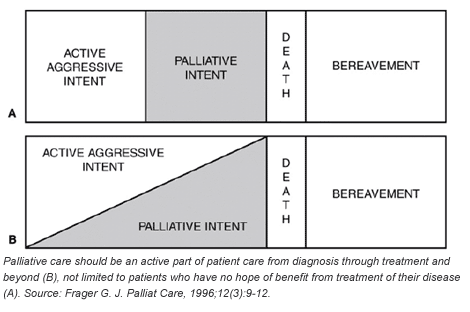 |

Guest Update by Dr. Ann O'Mara
Expanding the "Power of Palliation" Through Research
 Many people assume that palliative care is for the elderly or those on the brink of death, people who have so little time left that they should not be made to suffer discomfort from an illness or receive any more treatment. In truth, palliative care aims to minimize the harmful effects of a person's illness as well as the harmful effects of treatments from the point of diagnosis throughout the treatment process and beyond. These harmful effects can be physical (pain, dry mouth, heart weakness), mental (loss of memory, mental acuity), social (living without caretakers, lack of insurance), and emotional (depression, anxiety).
Many people assume that palliative care is for the elderly or those on the brink of death, people who have so little time left that they should not be made to suffer discomfort from an illness or receive any more treatment. In truth, palliative care aims to minimize the harmful effects of a person's illness as well as the harmful effects of treatments from the point of diagnosis throughout the treatment process and beyond. These harmful effects can be physical (pain, dry mouth, heart weakness), mental (loss of memory, mental acuity), social (living without caretakers, lack of insurance), and emotional (depression, anxiety).
 |
 |
Resources on Palliative Care |
 |
|
While advances in treatment are improving survival and reshaping cancer as a chronic disease, palliative care has become more important for cancer patients throughout the spectrum of their disease. For example, in 2004, a 28-year-old man came to NIH after being diagnosed with a rare metastatic tumor in his abdomen. After surgery, chemotherapy, and a stem cell transplant, his cancer recurred the following year. Today he is enrolled in a treatment clinical trial and he uses a variety of pharmacologic and behavioral therapies for the symptoms associated with his disease and its treatment, including pain and anxiety. He lives an otherwise normal life and has successfully started a career as an artist. Without a holistic approach to his cancer care, this young man's story might be very different.
Still, a host of research questions about palliative care remain. For instance, there is no effective treatment for the nerve damage caused by chemotherapy or for EGFR inhibitor-induced skin rashes and infections. Patients and families remain reluctant to report treatment- and disease-related symptoms. Methods for health care providers to document treatment-related toxicities are inefficient or inadequate. Clinicians continue to have trouble relating "bad news" to patients and may delay referring patients to hospice and other supportive care services.
In response to these and other
related issues, NCI is collaborating with other NIH institutes to stimulate research in several categories of palliative care that affect multiple diseases. In 2005, NCI partnered with the National Institute of Nursing Research and the Office of Research on Women's Health to fund 16 research projects aimed at improving the delivery of treatments to prevent or lessen the adverse physical and psychosocial consequences associated with cancer and its treatment. Many of the investigators are entering into the fourth year of their projects and some findings have been published, including studies on barriers to assessing and managing pain and what African American patients want from their physicians.

NCI also takes part in consortia and working groups created by NIH, such as the NIH Pain Consortium, Sleep Disorders Consortium, Fertility Preservation Work Group, and Medical Rehabilitation Advisory Board, to maximize research efforts. At NCI, the Symptom Management/Quality of Life Steering Committee focuses on guiding and initiating cancer-related palliative care studies. The research bases of NCI's Community Clinical Oncology Program also conduct clinical trials on palliative care within their network.
Susan Lowell Butler, a 13-year survivor of breast and ovarian cancer, can summarize the value of palliative care throughout cancer treatment. "I believe that palliative care should be an intrinsic part of the care plan for every cancer patient, from the time of diagnosis until the ultimate outcome of care, including long-term survivorship. The relief of pain and other side effects of the disease and its treatments are essential for a good quality of life, and people with cancer and those loved ones who care for them rely on the health care team to make them aware of the power of palliation."
Dr. Ann O'Mara
Head of Palliative Care Research
Community Oncology and Prevention Trials Research Group
NCI Division of Cancer Prevention
|